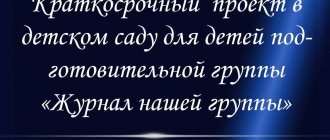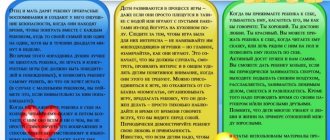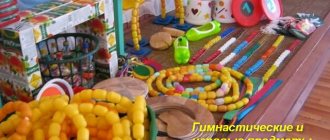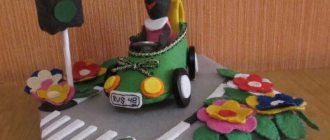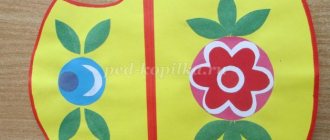Currently, preschool teachers are actively using the full pedagogical potential of traditional forms of interaction with the family and are looking for new, non-traditional forms of cooperation with parents in accordance with the changing socio-political and economic conditions of the development of our country.
Raising children is inextricably linked with the pedagogical education of parents. Which includes the systematic active dissemination of pedagogical knowledge among parents, the provision of practical assistance to families in raising children, improving the pedagogical culture of parents and intensifying their pedagogical education.
In accordance with the Federal State Educational Standard, a kindergarten is obliged to:
- inform parents (legal representatives) and the public regarding the goals of preschool education, common to the entire educational space of the Russian Federation, as well as about the Program, and not only to the family, but also to all interested parties involved in educational activities;
- ensure openness of preschool education;
- create conditions for the participation of parents (legal representatives) in educational activities;
- parents (legal representatives) in raising children, protecting and strengthening their health;
- ensure the involvement of families directly in educational activities, including through the creation of educational projects together with the family based on identifying needs and supporting the educational initiatives of the family;
- create conditions for adult representatives) of children on issues related to the implementation of the program.[3]
The task of a teacher who directly observes children and knows their problems is to attract parents to cooperation, to knowledge and understanding of pedagogical principles. It is important to activate and enrich the educational skills of parents, maintain their confidence in their own pedagogical abilities, and spread the positive experience of education in the family: spending family leisure time, following family traditions, etc. [1]
Our kindergarten today is in development mode, quickly responding to changes in the social composition of parents, their educational needs and educational requests. Depending on this, we change the forms and directions of work of the kindergarten with the family. We begin our work with an analysis of the social composition of parents, their mood and expectations from the child’s stay in kindergarten; surveys and personal conversations on this topic help to organize the work correctly, make it effective, and select interesting forms of interaction with the family.
In order for the kindergarten to become a source of information about the child and the development of parent-child relationships, we offer various forms:
- "Round table" on any topic;
- thematic exhibitions;
- social survey, diagnostics, tests, surveys on any topic;
- specialist consultations;
- family sports meetings;
- helpline mail, helpline;
- open classes for parents to watch;
- family talent competition;
- Open Day;
- DOW website.
The main form of cooperation with parents is parent meetings, which include the entire complex of the psychologist - the pedagogical influence of the kindergarten and the family. However, parents are reluctant to respond to mediocre and formal meetings in the form of reports and instructive conversations, which is quite understandable. We see a way out of this situation by changing the forms and methods of holding parent meetings, which in our kindergarten take place in the form of discussions, using active methods that can maintain a lively conversation for a long time. These include presentations about the life of children in kindergarten, puzzling questions about “spicy dishes,” moments of introspection when every parent thinks about their relationship with their child.[2]
One of the interesting and effective forms of interaction is the publication of a newspaper for parents “Rainbow Rays”, which is published in our preschool educational institution and is published quarterly. This is both a way to educate the family and inform about the life of the kindergarten, as well as a means of developing the creative abilities of teachers and children. Not only teachers, but also children from the preparatory group take part in the design of the newspaper. The newspaper, as a form of interaction with the family, is also relevant because the element of “coercion” disappears here, which psychologists talk about with alarm, emphasizing that it is this that pushes parents away and interferes with the perception of interesting and significant information. Information about what kind of intensive work is carried out with preschoolers in kindergarten changes the attitude of parents towards teachers and, in general, towards the work of preschool educational institutions. Often parents do not see the amount of work that is being done with their children. Many, especially in early age groups, are only interested in what and how their child ate, whether he slept well, and the teacher does not always have the opportunity to advise and answer parents’ questions, because children cannot be left unattended. Parents often don’t have time to read the information stands that are in each group, but you can take the newspaper with you and read it at home in a calm environment.
A family club “We are together” was created at the preschool educational institution, which parents have been actively visiting for several years. The goal of the club: to create cooperation in each group that is diverse in content, promoting the development of constructive interaction between teachers and parents with children. During the work of the club, entertainment, family competitions, master classes are held, parents share their problems, family experiences, and health recipes. Family club classes are held once a month. All parents or family members, as well as guests, are invited to participate in the work of the club, i.e. attracted specialists in accordance with previously identified requests.
Together with my parents, a mini-museum was organized for the 70th anniversary of Victory in the Great Patriotic War. This form of work helps to foster patriotic feelings and systematize previously acquired knowledge in children.
“Open Day at a preschool educational institution” is one of the forms of working with parents, which provides them with the opportunity to get acquainted with the educational institution, its traditions, rules, and objectives of the educational process. Kindergarten gives adults the opportunity to “live” a day in kindergarten, feel the atmosphere of children’s life, and see the work of teachers. During this day, they can visit various types of joint activities between teachers and children, get acquainted with the organization and content of routine moments.
One of the forms of interaction between preschool educational institutions and parents is “My Family” day. On this day, parents of different professions (seamstress, driver, doctor, librarian, policeman, military, hairdresser, etc.) come to visit preschoolers and introduce the pupils to the features of their profession. Also in our preschool educational institution there is a day of “Good Deeds”, which is held once a month, parents are involved in cleanup days, to participate in landscaping the territory of the preschool educational institution, in the winter season: building slides and snow figures.
Joint thematic exhibitions of crafts and drawings of children and parents are regularly held in the kindergarten. We reward all families who take part with thanks and diplomas at the group level, and the most active families who take part not only at the kindergarten level, but also at the city level are awarded with certificates and gifts from the kindergarten.
Currently, the project method is actively used, when parents are involved in completing a certain part of the overall task, for example, introducing preschoolers to their hometown. They collect information about architecture, names of streets, squares, take photographs, etc. Then they present their work at a general event (meeting, meeting of the “We Are Together” club), the best projects are published in the newspaper of the preschool educational institution. This method helps bring parents, children and teachers closer together.
One of the most favorite types of joint activities is the participation of parents in holidays. Live communication with mom or dad brings special pleasure to children, and parents, immersing themselves in the world of a children's party, better understand their children, their desires and interests.
All information about events held in the kindergarten is posted on the kindergarten’s website and supported by photographs (consents have been signed with all parents to post photographs of children). On the website of the preschool educational institution, any parent has the opportunity to get acquainted with the features of the educational process in the preschool educational institution, find out the latest news and thus always be aware of all the events taking place in the kindergarten. Kindergarten e-mail is used to work with written messages from parents, establishing dynamic and effective feedback in the work of the kindergarten with the family; it does not replace communication, but serves as a good reason to make it productive, understandable and rich.
With such an integrated approach, parents become the most active helpers and faithful companions of teachers in any endeavor.
Using various forms of work with families of kindergarten students gives positive results. With all their work, preschool employees prove to parents that their involvement in teaching activities, interested participation in the educational process is important not because the teacher wants it, but because it is necessary for the development of their own child.
Literature
- Zvereva O. L., Krotova T. V. Communication between a teacher and parents in a preschool educational institution: Methodological aspect. – M.: TC Sfera, 2005. – 80 p.
- Metenova N. M. Parent meetings in kindergarten. 2nd junior group. – M.: “Publishing house Scriptorium 2003”, 2008. – 104 p.

